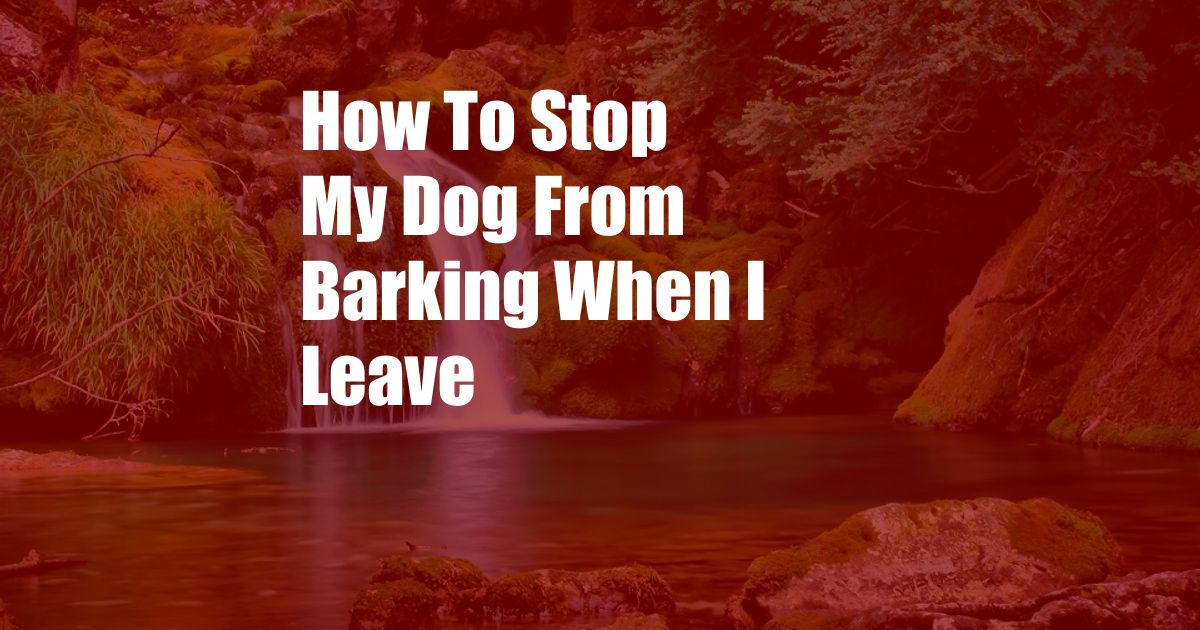
How to Curb Your Dog’s Barking When You Leave Them Alone
Do you dread leaving your furry companion home alone, only to be met with an incessant chorus of barking upon your return? This frustrating behavior can be a nuisance to both you and your neighbors. Understanding the reasons behind your dog’s vocalizations and implementing effective training methods can help you regain peace and quiet in your home.
Understanding the Reasons for Barking
Dogs bark for a variety of reasons, including:
- Anxiety or fear: Being left alone can trigger separation anxiety or fear in some dogs, leading them to bark as a way of expressing their distress or calling for your return.
- Boredom: A bored dog may resort to barking to stimulate themselves or attract your attention.
- Territorial or protective instincts: Dogs naturally guard their territory, and barking can be a way of deterring perceived threats or alerting you to the presence of strangers.
- Medical conditions: Occasionally, barking can be a symptom of an underlying medical condition, such as pain or cognitive dysfunction.
Training Your Dog to Stop Barking When Left Alone
- Establish a routine: Dogs thrive on predictability, so establish a consistent routine for when you leave and return home. This helps them anticipate your absence and reduce anxiety.
- Tire your dog out: Before leaving them alone, engage your dog in physical and mental activities, such as walks, playtime, or interactive puzzles. A tired dog is less likely to bark out of boredom or pent-up energy.
- Create a calm environment: Leave your dog in a safe and comfortable space, such as a crate or a quiet room with their favorite toys and treats. This helps them feel secure and less anxious.
- Desensitization and counter-conditioning: Gradually expose your dog to the triggers that cause them to bark, such as the sight or sound of you leaving. Start by practicing in short sessions when you are still present, rewarding your dog for staying calm. Over time, gradually increase the intensity and duration of the exposures.
- Positive reinforcement: Reward your dog for quiet behavior. When they are calm and quiet while you are away, greet them enthusiastically and give them treats or praise upon your return.
- Consider using a bark collar: As a last resort, you may consider using a bark collar. However, it’s important to choose a collar that is humane and doesn’t cause your dog any pain or discomfort.
FAQ on Stopping Your Dog’s Barking
-
Q: How long will it take to train my dog to stop barking?
A: The time it takes will vary depending on the severity of the problem and your dog’s individual personality. Be patient and consistent with your training, and don’t give up if you don’t see immediate results. -
Q: What if I’m not home to train my dog?
A: Consider hiring a dog trainer or pet sitter who can help you implement your training plan when you’re away. -
Q: Can I leave my dog alone if they bark?
A: It’s not recommended to leave a barking dog alone, as it can be a sign of distress or an underlying health issue. If you must leave them alone temporarily, ensure they have plenty of water, a safe and comfortable space, and access to enrichment activities.
Conclusion
Conquering your dog’s barking problem requires a multifaceted approach that combines understanding the causes, implementing training techniques, and providing a supportive environment. By following the tips and advice outlined in this article, you can create a peaceful and harmonious home for both you and your canine companion.
Are you interested in learning more about dog training or behavior management? Let us know your questions, and we’ll be happy to provide more information or connect you with resources.